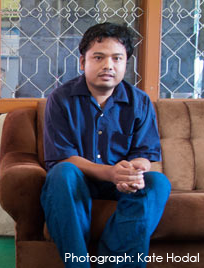The Story of Alexander Aan: An Indonesian Atheist Fears for His Life

America may have its own issues with non-believers and secularism, but atheistic Americans should be thankful that they likely won’t ever have to experience the abuse that Alexander Aan has been subjected to in the past few months.
Alexander is something of a rarity in Indonesia—a non-believer. While the Indonesian constitution does guarantee freedom of religion, the government only recognizes six official religions (Islam, Protestantism, Catholicism, Hinduism, Buddhism, and Confucianism), and Indonesian law requires that every citizen hold an ID card that identifies that person with one of the six official religions. Almost every Indonesian identifies with some faith, with 87% of Indonesians identifying themselves as Muslim, 7% as Protestant, 3% as Catholic, 2% as Hindu, and 0.8% as Buddhist.
Unfortunately, Indonesia does not recognize agnosticism or atheism, and blasphemy is illegal, often carrying at least a 5-year jail sentence for offenders. Alexander, who works as a civil servant in Indonesia, found this out the hard way when he posted “God does not exist” on his Facebook page.
When Alexander arrived at work at the Dharmasraya Development Planning Board the next day a group of men, many of them also civil servants, attacked and beat him before police arrived and took him into protective custody. Police are now holding him until his trial for blasphemy is completed, although authorities moved Alexander from his local prison after he was badly beaten by a group of inmates who knew about his case.
But his potential jail sentence is not the only punishment Alexander faces. He is likely to lose his job, and Muslim extremists have called for Aan to be beheaded. Alexander’s is the first case in which an atheist is being tried in relation to the first pillar of Indonesia’s state philosophy – pancasila, which requires religious belief of Indonesia’s citizens.
The Indonesian government now faces an important decision—will they stand up to support the human rights of all Indonesian citizens to believe or disbelieve as they choose, or will they reaffirm the tyrannical and discriminatory anti-blasphemy laws? This decision will determine not only Alexander’s fate, but the fate of those who are without religion in Indonesia.
The American Humanist Association is already working on behalf atheists abroad who have been abused for their disbelief by meeting with officials from the U.S. Department of State’s Office of International Religious Freedom (IRF). We are pleased to report that the IRF intends to increase its promotion of the freedom to not believe through new international program work and comprehensive reports on atheist or humanist discrimination abroad. If you are aware of discrimination against nonbelievers outside of the United States, we would like to hear from you (hnn@americanhumanist.org).
You can also join us in our effort to promote international religious freedom by contributing to Alexander’s legal defense fund. Alexander is just one of many non-believers who can’t be open with their disbelief for fear of punishment, but with your help he may be the catalyst for global change. We must remind the world that religious freedom isn’t just about the freedom to believe in a minority religion free from governmental and societal oppression. Until non-believers can feel safe in their disbelief, the world will never truly know religious freedom.
